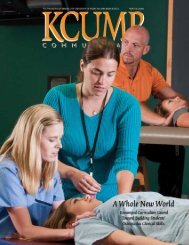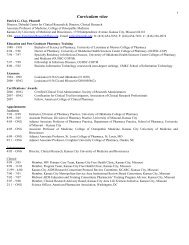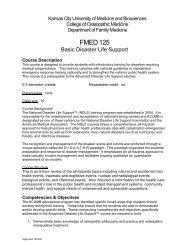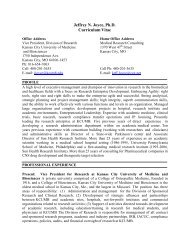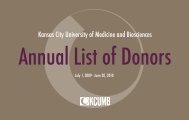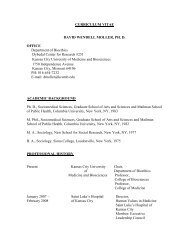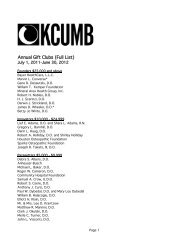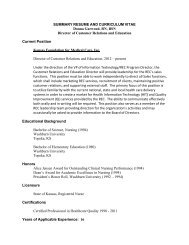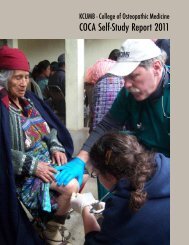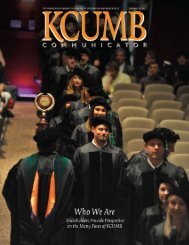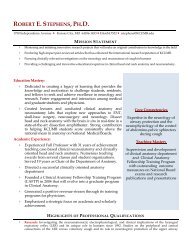2009-2010 KCUMB College Catalog - Kansas City University of ...
2009-2010 KCUMB College Catalog - Kansas City University of ...
2009-2010 KCUMB College Catalog - Kansas City University of ...
Create successful ePaper yourself
Turn your PDF publications into a flip-book with our unique Google optimized e-Paper software.
* Special Note: Dual degree students who are simultaneously completing the D.O.<br />
program and M.A. in bioethics program may substitute a combination <strong>of</strong> IDIS<br />
110: Ethics for Physicians and BETH 506: Exploring the Foundations <strong>of</strong> Bioethics<br />
in lieu <strong>of</strong> the required course, BETH 502: Introduction to Bioethics. However,<br />
dual degree bioethics students who choose this option may not use IDIS 110 to<br />
partially fulfill their 4 semester elective requirement in the D.O. program.<br />
Master <strong>of</strong> Arts in Bioethics (Career Enhancement Track)<br />
This track is designed for health-care pr<strong>of</strong>essionals – physicians, nurses, social<br />
workers, attorneys, chaplains, medical technicians, etc., who have developed an interest<br />
in bioethics pr<strong>of</strong>essionally and would like to pursue master’s-level training in bioethics.<br />
These students may pursue the master’s degree on a part-time basis, although the<br />
expectation is that the degree will be completed by five years. There is no required order<br />
<strong>of</strong> courses for completion <strong>of</strong> the bioethics degree. Therefore, career enhancement<br />
students may take the required and elective courses in the order that works best for their<br />
individual schedules.<br />
Bioethics Course Descriptions<br />
BETH 501 – History and Methodology for Bioethics<br />
This course establishes the philosophical foundations for bioethics. The course<br />
begins with a survey <strong>of</strong> key historical figures, such as Plato, Aristotle, Kant and Mill, as<br />
well as several representative 20th century figures, such as Rawls and Nussbaum.<br />
Connections between these philosophers and current issues in bioethics are identified<br />
and explored along the way. The course also examines different methods <strong>of</strong> ethical<br />
reasoning, such as deontology, teleology, casuistry, aretology and narrative approaches.<br />
3 semester credits<br />
BETH 502 – Introduction to Bioethics<br />
This course provides an overview <strong>of</strong> the major areas <strong>of</strong> bioethics. Participants gain<br />
familiarity with the terminology, resources and major frameworks <strong>of</strong> ethical analysis<br />
involved in the field <strong>of</strong> bioethics. Issues that are examined and analyzed include problemsolving<br />
methods, the theory and practice <strong>of</strong> informed consent, end-<strong>of</strong>-life decisionmaking,<br />
physician-assisted death, pediatric ethical dilemmas, resource allocation and<br />
problems posed by managed care, research ethics and organ transplantation. Extensive<br />
use <strong>of</strong> case discussion and analysis assist learners in developing and enhancing problemsolving<br />
skills.<br />
3 semester credits<br />
165




